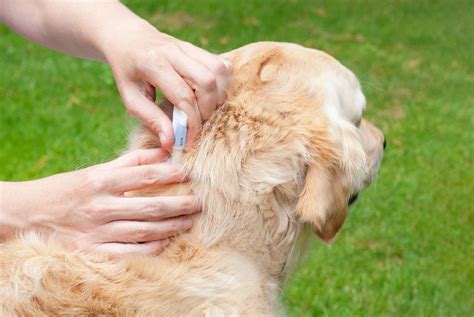Are you worried about your furry friend’s well-being? Parasites can be a major threat to your dog’s health, causing a range of issues from mild discomfort to life-threatening illnesses. However, with the right knowledge and preventative measures, you can keep your dog parasite-free and ensure their overall health and happiness.

1. Tick Control: A Battle Against Disease
Ticks are tiny arachnids that can transmit a variety of diseases to dogs, including Lyme disease, Rocky Mountain spotted fever, and ehrlichiosis. Ticks are most active during the spring and summer months, so it’s important to be vigilant about checking your dog for ticks after spending time outdoors.
Prevention:
- Use Tick Repellents: Topical tick repellents containing ingredients like permethrin or fipronil can effectively repel ticks for up to a month.
- Regularly Check Your Dog: Conduct thorough tick checks on your dog after every walk or playtime in wooded areas. Remove any ticks immediately with tweezers.
- Maintain a Tidy Yard: Keep your yard free of overgrown vegetation and debris, as these areas provide ideal hiding spots for ticks.
Treatment:
If your dog has contracted a tick-borne disease, prompt treatment is crucial. Consult with your veterinarian for appropriate antibiotics or other medications.
2. Flea Control: Beyond Itching and Biting
Fleas are wingless insects that can cause intense itching, skin irritation, and even allergic reactions in dogs. They can also transmit diseases like tapeworms and Bartonella.
Prevention:
- Use Flea Preventatives: Monthly flea and tick preventatives containing active ingredients like fipronil or selamectin kill fleas and prevent them from re-infesting your dog.
- Regular Bathing and Brushing: Frequent bathing and brushing can remove fleas and flea eggs from your dog’s coat.
- Vacuum Regularly: Vacuuming your home regularly, especially areas where your dog spends time, can help remove fleas and their eggs.
Treatment:
If your dog has fleas, consult with your veterinarian for appropriate treatment options, which may include topical flea treatments, shampoos, or oral medications.
3. Heartworm Control: A Silent and Deadly Threat
Heartworms are parasitic worms that live in the heart and lungs of dogs. They are transmitted through mosquito bites and can cause severe damage to the heart and lungs, leading to death if left untreated.
Prevention:
- Regular Heartworm Testing: Have your dog tested for heartworms annually, especially if they are exposed to mosquitoes.
- Monthly Heartworm Preventatives: Heartworm preventatives containing active ingredients like ivermectin or milbemycin oxime kill heartworm larvae and prevent adult heartworms from developing.
- Mosquito Control: Reduce mosquito breeding grounds around your home by eliminating standing water and keeping lawns mowed.
Treatment:
Treatment for heartworms is complex and time-consuming, and can involve injections, medications, and surgery. Regular testing and prevention are essential to prevent this life-threatening disease.
4. Intestinal Parasites: Unseen Enemies
Intestinal parasites, such as roundworms, hookworms, and whipworms, can cause a range of symptoms in dogs, including diarrhea, vomiting, weight loss, and lethargy. These parasites are often transmitted through contact with infected feces or soil.
Prevention:
- Regular Fecal Exams: Have your dog’s feces checked by a veterinarian for the presence of intestinal parasites.
- Deworming Medications: Puppies and dogs with a history of intestinal parasites may require regular deworming medications to eliminate the parasites.
- Hygiene: Practice good hygiene by cleaning up after your dog’s feces and preventing them from eating feces or other contaminated substances.
Treatment:
Treatment for intestinal parasites typically involves oral medications to kill the parasites and restore your dog’s health.
5. Common Mistakes to Avoid
- Skipping Preventatives: Regular use of parasite preventatives is crucial for keeping your dog protected.
- Using Human Products: Never use human flea and tick products on dogs, as they can be toxic.
- Under-dosing or Over-dosing Preventatives: Follow the instructions on the product label carefully to ensure proper dosing.
- Ignoring Parasite Symptoms: If you notice any signs of parasites in your dog, consult with your veterinarian promptly.
- Assuming Indoor Dogs Are Not at Risk: Even indoor dogs can be exposed to parasites through contact with other animals, contaminated soil, or even mosquitoes.
6. FAQs
Q: How often should I apply flea and tick preventatives?
A: Most flea and tick preventatives are applied monthly.
Q: Can I use essential oils for parasite control?
A: While some essential oils have insect-repellent properties, they can be toxic to dogs and should not be used as a primary method of parasite control.
Q: Is heartworm prevention necessary for indoor dogs?
A: Yes, even indoor dogs can be exposed to mosquitoes and should be protected with heartworm prevention.
Q: What are the signs of intestinal parasites?
A: Signs of intestinal parasites can include diarrhea, vomiting, weight loss, lethargy, and abdominal pain.
7. Future Trends and Improvements
Precision Parasite Control: Advancements in technology are leading to more precise parasite control methods, such as targeted treatments that specifically attack certain parasites.
Personalized Prevention: Veterinary research is exploring tailored parasite prevention plans based on a dog’s individual risk factors and lifestyle.
Non-Chemical Alternatives: Researchers are investigating natural and environmentally friendly alternatives to traditional parasite control products.
Conclusion
Protecting your dog from parasites is essential for their overall health and well-being. By following these comprehensive parasite control and prevention strategies, you can keep your furry friend safe and healthy for years to come. Remember to consult with your veterinarian for personalized advice and to address any specific parasite concerns you may have. By working together, you can ensure a parasite-free life for your beloved companion.





















